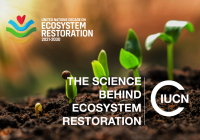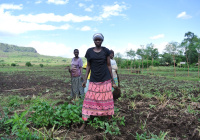Governance and Rights
The fulfilment of IUCN’s mission requires the Union to address and effectively integrate key social issues in its conservation programmes.
News
-
 Sustainably managed mangroves can provide ecosystem services such as coastal protection, food and medicines as well as carbon storage, positively impacting both biodiversity and human well-being. The IUCN Global Standard for NbS provides a tool to help ensure that projects labelled as Nature-based Solutions - for example through restoration of mangroves - do indeed deliver the anticipated benefits to both society and biodiversity.
Photo: Maxwell Ridgway / Unsplash
Sustainably managed mangroves can provide ecosystem services such as coastal protection, food and medicines as well as carbon storage, positively impacting both biodiversity and human well-being. The IUCN Global Standard for NbS provides a tool to help ensure that projects labelled as Nature-based Solutions - for example through restoration of mangroves - do indeed deliver the anticipated benefits to both society and biodiversity.
Photo: Maxwell Ridgway / Unsplash
Learn more
Indigenous Peoples
Indigenous peoples hold and manage a significant part of the Earth’s most biodiverse regions and play a vital role in conserving lands, seas and resources. They cultivate strong economic, cultural and spiritual relationships with their natural environments and have developed and often...
An IUCN Natural Resource Governance Framework
Natural resource governance refers to the norms, institutions and processes that determine how power and responsibilities over natural resources are exercised, how decisions are taken and how people – including women, men, youth, indigenous peoples and local communities – participate in...
Gender equality and women's empowerment
Gender equality and equity are matters of fundamental human rights and social justice, as well as a pre-condition for sustainable development. IUCN is committed to furthering gender equality and equity in order to build a Union that understands the importance of equal opportunity and...
Quick reads
Aimed at policy-makers and journalists, IUCN Issues Briefs provide key information on selected issues in a two-pager format.







